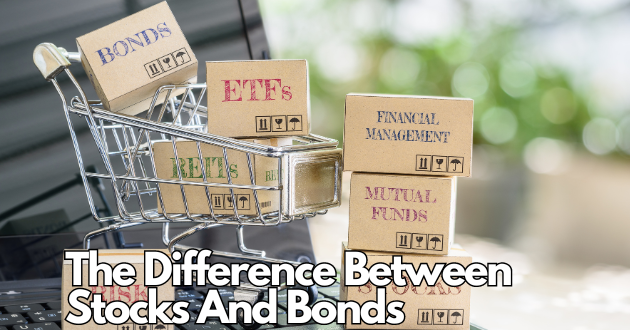Investing involves choices, especially understanding the difference between stocks and bonds. Investing in stocks means becoming an owner of a company whereas bonds resemble loans provided to the issuer. Understanding this difference is essential, for every investor. We will delve into the aspects of stocks and bonds helping you gain an understanding of their respective roles within your investment portfolio.
What are Stocks?
Stocks symbolize ownership in a corporation. When you purchase stocks it signifies that you have a stake, in that company. If the company flourishes the value of your stocks rises. Unlike bonds stocks do not assure returns. Present the possibility for growth. This disparity, between stocks and bonds is crucial; while stocks involve risk they can also yield returns.
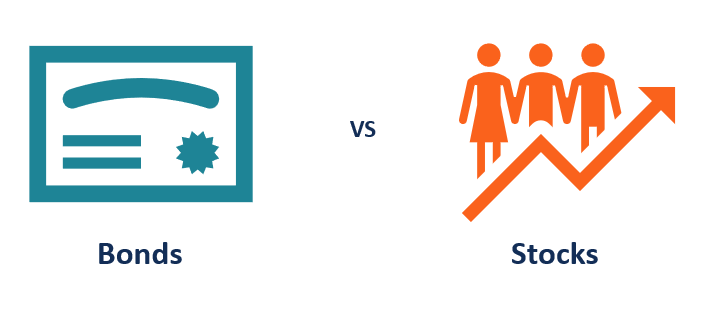
Are Stocks Overvalued?
Analyzing market trends and company performance is key, in assessing whether stocks are overvalued. Unlike bonds, whose value’s relatively straightforward stocks are influenced by investor sentiment and economic conditions. This variability is a notable difference between stocks and bonds. Stocks can seem overvalued when prices are high relative to earnings.
Are Stocks Liquid Assets?
Stocks are generally considered to be assets, which means they can be easily converted into cash. This liquidity provides an advantage, over bonds that may have longer maturity periods. The ability to trade stocks with ease is a distinction between stocks and bonds offering investors flexibility, in their investment strategies.
Are Stocks Going Up?
The stock market can be quite unpredictable. Although stocks generally tend to increase in value over the run it is not uncommon to experience short term fluctuations. This unpredictability stands in contrast, to the nature of bonds. The key distinction between stocks and bonds lies in the potential for returns, with stocks compared to the stability offered by bonds.
Are Stocks Assets?
Yes, stocks are considered assets. Stocks can play a role, in boosting your financial value and are crucial, for diversifying your investment portfolio. Unlike bonds, which symbolize borrowed money stocks represent ownership in a company.This ownership aspect is a crucial difference between stocks and bonds.
Are Stocks Overvalued Right Now?
To determine if stocks are currently overpriced one needs to conduct an analysis of the market. Various factors such, as the state of the economy company profits and investor sentiment come into play. It’s important to note that this assessment differs from evaluating bonds, which primarily involves considerations of interest rates and credit risk. The process of valuing stocks highlights a distinction, between them and bonds.
Are Stocks Taxed?
When you sell stocks and make a profit you need to consider capital gains tax. The rate of tax depends on the duration for which you have held the stocks. It is important to note that this tax aspect is different, from bonds as the interest income from bonds is usually taxed as income. Having an understanding of the tax implications is crucial, in distinguishing between stocks and bonds.
Are Stocks Haram?
In finance the classification of stocks, as halal or haram depends on the nature of the companys business operations. This ethical aspect sets stocks apart from bonds, which can be considered haram due to the involvement of interest (riba). The inclusion of considerations introduces a layer of differentiation, between stocks and bonds.
Are Stocks a Good Investment?
Investing in stocks can be an option, for individuals looking to grow their wealth. Are willing to take on a bit more risk. Unlike bonds, which tend to be more stable but offer returns stocks have the potential for profits. This trade off between risk and reward is one of the distinctions, between stocks and bonds.
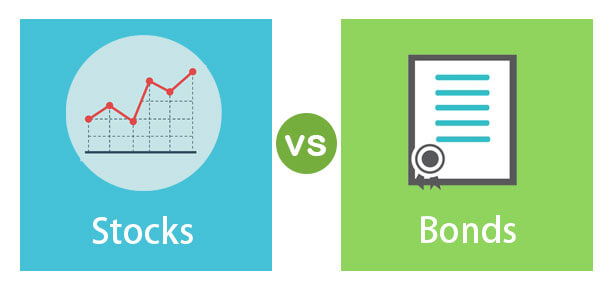
Can Stocks Make You Rich?
Investing in stocks can be a way to grow your wealth especially when you adopt long term strategies and have a portfolio. Although it’s important to note that there are no guarantees, in the stock market and it does come with its share of risks. The allure of returns, from stocks compared to the safer bonds is what sets them apart.
Can Stocks Make You Money?
Certainly investing in stocks can be a venture as it offers the possibility of capital growth and regular dividend payments. However it’s important to note that investing in stocks also carries the risk of losses unlike the more reliable and predictable returns typically associated with bonds. This risk-reward balance is a key difference between stocks and bonds.
Can Stocks Be Transferred to Another Person?
Shares can be transferred to individuals providing an investment opportunity. This ability to transfer ownership sets them apart, from bonds, which often come with limitations on their transferability. Additionally the ease of transferring ownership is another distinguishing factor, between stocks and bonds.
Can Stocks Be Used as Collateral?
In some cases stocks can serve as collateral for loans offering a level of flexibility that may not always be available, with bonds depending on their type and terms. The capability of using stocks as collateral emphasizes a distinction between stocks and bonds, in practice.
Can Stocks Put You in Debt?
When you invest in stocks it doesn’t automatically lead to debt. There is a possibility of experiencing losses. Unlike purchasing bonds, where you lend money and anticipate repayment investing in stocks entails a level of uncertainty without any guaranteed profits. This element of risk serves as a distinction, between stocks and bonds.
Do Stocks Count as Income?
Stocks aren’t considered as income themselves. The dividends you receive from them are. It’s important to note that these dividends differ from regular and fixed bond interest payments. Another point of distinction, between stocks and bonds lies in how they generate income.
Do Stocks Have Expense Ratios?
Stocks that you own individually don’t come with expense ratios. If you invest in stock funds then there will be expense ratios involved. On the hand when it comes to bonds individual bonds themselves don’t have expense ratios. If you invest in bond funds then there will be expense ratios to consider. It’s important to comprehend these costs as they contribute to distinguishing between stocks and bonds.
Do Stocks Pay Out Interest Annually?
Stocks do not generate interest. Instead they have the potential to pay dividends although this is not guaranteed and can vary. On the hand bonds generally provide interest payments often on an annual basis. This distinction in income generation is a key difference between stocks and bonds.
Does Stocks Compound Interest?
Stocks do not generate compound interest. Instead their value increases through market appreciation and dividends that are reinvested. This growth mechanism sets stocks apart, from bonds as bonds can accumulate compound interest when the interest payments are reinvested. It is important to grasp these growth strategies to understand the distinction, between stocks and bonds.
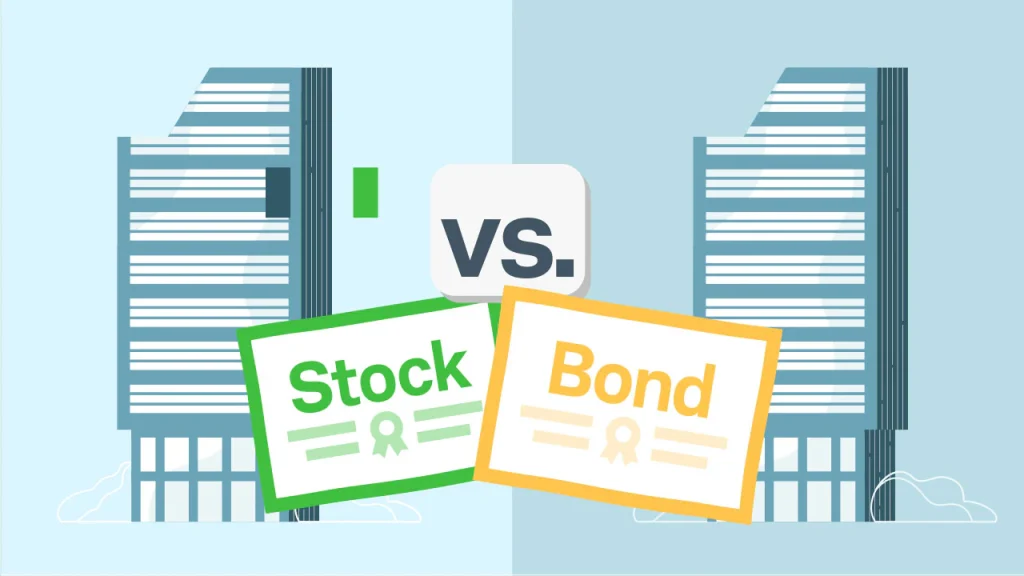
Does Stocks Count as Income for Mortgage?
When you apply for a mortgage the income you receive from stocks, as dividends can be taken into account. However it’s worth noting that this type of income is generally less predictable compared to the interest income from bonds. Lenders often view bond income as stable. This perception influences how they assess your financial situation.
Is Stocks an Economic Resource?
Stocks are an asset because they represent ownership, in companies that contribute to the economy. Unlike bonds, which represent borrowing money stocks signify a stake, in the companys success.
Where Did Stocks Originate?
The idea of stocks dates back, to the century when the Dutch East India Company pioneered the concept of issuing company shares. This historical development stands in contrast, to bonds, which have served as debt instruments for centuries.
What are Bonds?
Bonds are investment instruments that are issued by entities such, as governments or corporations. When you invest in a bond you essentially lend money to the issuer. Receive interest payments along, with the repayment of the bonds initial value upon maturity. Unlike stocks bonds provide predictable returns.
Are Bonds a Good Investment?
Investing in bonds can be a choice, for individuals who value stability and reliable income. Bonds tend to carry risks compared to stocks although the potential returns are usually lower well. This risk-return profile is a crucial difference between stocks and bonds.
Are Bonds Safe?
Bonds are often seen as an investment option compared to stocks because of their income and lower level of price swings. However it’s important to note that bonds are not, without risks, such as credit risk and interest rate risk. Having an understanding of these risks is crucial in recognizing the distinctions, between stocks and bonds.
Are Bonds Safer Than Stocks?
Usually bonds are considered to be safer, than stocks. The reason is that bonds provide a fixed interest payment and guarantee the return of the investment when they mature, unlike stocks which can have fluctuating returns. This stability is a factor that distinguishes bonds from stocks and makes them attractive, to investors who prefer to avoid taking risks.
Are Bonds Riskier Than Stocks?
In general stocks are considered riskier, than bonds. Bonds offer a source of income and are less affected by market changes. However it’s important to note that certain types of bonds such, as junk bonds can have levels of risk associated with them. This varying level of risk is one of the factors that differentiate stocks from bonds.
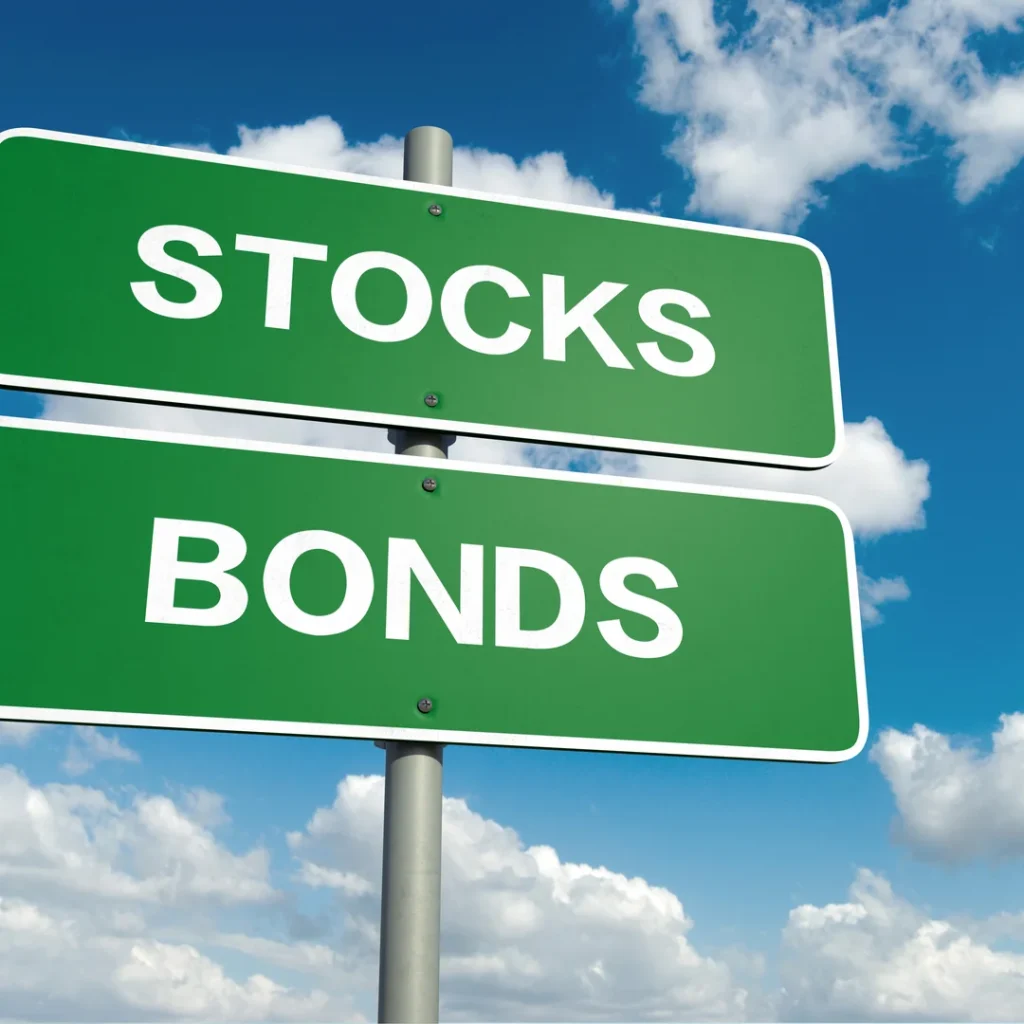
Are Bonds Payable Current Liabilities?
Long term debts, such, as bonds are considered liabilities unless they are set to be repaid within a year. On the hand stocks symbolize ownership. Do not fall under the category of liabilities. This distinction in accounting treatment is one of the factors that sets stocks apart, from bonds.
Are Bonds Taxable?
The majority of bonds are subject, to taxes, including sometimes state taxes on the interest income they generate. However there are types of bonds, such as bonds that provide tax exempt interest. This difference in tax treatment is a distinction, between stocks and bonds.
Can Bonds Be Purchased on Margin?
Typically it’s possible to buy bonds with margin. Its important to be aware of the associated risks. Buying bonds, with leverage is not the same as buying stocks on margin since their risk profiles differ. This investment strategy helps emphasize the contrast, between stocks and bonds.
Can Bonds Be Traded?
Bonds are tradable although they tend to have liquidity compared to stocks. The bond market, in general is less transparent resulting in trading activities. This difference in market dynamics is a distinction, between stocks and bonds.
Do Bonds Pay Dividends?
Bonds do not offer dividends, like stocks do; instead they provide interest payments called coupon payments. This consistent payment of interest is one of the distinctions, between stocks and bonds. Unlike the fluctuating dividends of stocks bonds offer an income.
Do Bonds Compound Interest?
Bonds have the potential to generate compound interest when the interest payments are reinvested. However unlike stocks bonds do not experience any benefits from market appreciation. This interest mechanism is part of the difference between stocks and bonds.
Do Bonds Have a Maturity Date?
Indeed bonds come with a maturity date upon which the bondholder receives back the amount. This aspect of having a fixed term is what sets bonds apart, from stocks as stocks do not have such a maturity date.
Do Bonds Pay Monthly?
Bonds often distribute interest on a basis although it is more typical for them to pay out semi annually. This payment arrangement differs from stocks as dividends, in the stock market are generally less consistent and predictable.
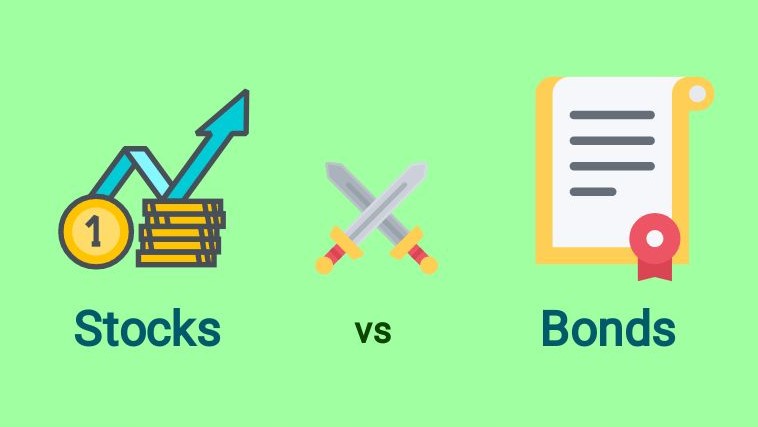
Do Bonds Have Fixed Interest Rates?
Bonds often offer predictable income due, to their fixed interest rates, which’s in contrast to the fluctuating nature of stock dividends. The consistency in bond payments is a distinguishing factor, between stocks and bonds.
Does Bonds Have Risk?
Bonds come with risks, such, as interest rate risk, credit risk and inflation risk. Although they are generally considered safer than stocks it’s important to understand that they are not without risks. Recognizing these risks is crucial in grasping the distinctions, between stocks and bonds.
Is Bonds Payable an Asset?
Bonds that are payable create a liability, for the entity that issues them. They serve as an asset for the investor. This distinction in accounting perspective is a factor that sets bonds apart, from stocks. Bonds signify a debt obligation whereas stocks signify ownership.
Where to Invest in Bonds?
There are ways to invest in bonds, such, as bond funds, individual bonds or government securities. Each option carries its set of risks and potential returns. This wide range of investment options clearly showcases the distinction, between stocks and bonds.
Which Bonds are Tax Exempt?
Municipal bonds are often exempt, from taxes, which makes them appealing to investors who fall into tax brackets. This difference in tax treatment is a factor that distinguishes bonds from stocks since dividends earned from stocks are usually subject, to taxation.
Will Bonds Go Up in 2024?
It can be quite difficult to predict how the bond market will behave. Various factors, such, as interest rates and economic conditions play a role in influencing bond prices. While the level of uncertainty in the bond market may be lower compared to the stock market it is still one of the distinctions, between stocks and bonds.
What are the Difference Between Stocks and Bonds?
Stocks and bonds have characteristics. Stocks represent ownership in a company whereas bonds are a form of debt. While stocks offer the potential, for returns they also come with increased risk. On the hand bonds provide a stable and fixed income.
What is the Main Difference Between Stocks and Bonds?
The primary distinction, between stocks and bonds revolves around their risk. Return characteristics. Stocks have the potential for returns. They also come with increased risk. On the hand bonds provide a stable investment option albeit, with typically lower returns.

What’s the Difference Between Stocks, Bonds, and Mutual Funds?
The difference between stocks and bonds is clear: stocks are ownership, bonds are debt. Mutual funds are investment vehicles that bring together funds, from investors to create a portfolio of various assets. This diversification helps to spread the risk and potentially enhance returns.
What is the Difference Between Stocks and Bonds Quizlet?
Quizlet and other similar platforms provide materials that explain the distinction, between stocks and bonds. Stocks represent ownership in a company. Can yield varying returns whereas bonds represent debt investments and offer fixed returns.
Final Thought Difference Between Stocks And Bonds
Understanding the difference between stocks and bonds is crucial for investors. Investing in stocks allows you to become a part owner of a company and potentially benefit from its growth. On the hand bonds offer a source of income and are considered relatively safe investments. Deciding how to allocate these in your investment portfolio depends on your individual risk tolerance and financial goals.
 Usalia
Usalia
